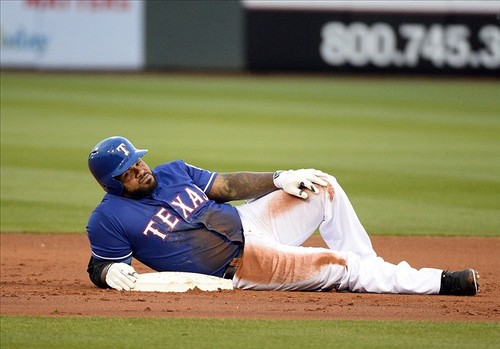
Baseball legalese is a funny thing. If a player under a contract declares retirement, they immediately forfeit the remainders of owed money on the contract. However if a player under a contract declares that they are not physically capable of playing baseball any further, but not actually using the terminology “retirement,” then technically, the team(s) responsible for the contract are still obligated to continue paying their financial obligations.
Player A declares retirement, despite having one year and $12 million dollars left on his contract. His team is absolved of having to pay $12 million dollars, upon finalization of retirement.
Player B holds a press conference to let the world know that he is physically incapable of playing baseball any further. His contract has 4+ years remaining on it, at an estimated annual salary of $24 million dollars, per year. As he has not officially declared himself retired, the contract is legally obligated to continue to be paid out until it expires or retirement is declared.
Player A is Gil Meche, a mediocre pitcher who lucked into a lucrative contract with the Kansas City Royals in 2006. Benefitting primarily because of a weak market for pitchers, he signed a 5-year, $55 million deal that was met with boatloads of criticism and scrutiny. To nobody’s surprise, he didn’t pitch completely terribly, but not really worth the money he was being paid. Throughout the first four years of the contract, Meche pitched in 111 games, won 29, lost 39 and had an ERA of 4.27.
However, prior to the start of the 2011 season, Gil Meche declared retirement from baseball. Quick were people to point out that he still had one season left on his contract, set to make $12 million dollars. Meche didn’t care. Citing shoulder pain and the belief that he was no longer earning his paycheck, there was no second-guessing, hemming or hawing over his decision. Meche retired, and the Royals were absolved of the $12 million dollars he was owed in 2011.
Suddenly, everyone who had criticized the Royals for offering, and Meche for taking the deal had nothing bad to say. Bean counters were quick to lambast Meche from walking away from essentially free money, but even had to pause to acknowledge the integrity behind his move. Purists made Meche into something of a hero, for choosing his health, comfort and self-respect, and ultimately his family and future over another $12 million dollars on top of the $50 million+ he had already earned throughout his career. And the Royals themselves certainly weren’t going to balk at being able to reallocate $12 million dollars to possibly more useful assets.
I’m not saying Gil Meche’s relinquished $12 million dollars in 2011 was the catalyst behind the Royals’ 2015 World Series championship, but it wouldn’t be that hard to go back and see how much it did impact things like arbitration raises, placeholder free agents and other numerous little things that could have led to the team’s revitalization.
Player B is Prince Fielder, a fat* first baseman-slash-designated hitter that just declared his physical inability to continue to play baseball but isn’t actually retiring so that the remainder of his contract must still be paid out. Said remainder of contract is for 4-years, $96 million dollars, plus the prorated remainder of the 2016 season; a far, far cry from the 1/$12M that Gil Meche walked away from.
*Not opinion, genuinely fact
But because in spite of the overly-dramatic press conference, the crocodile tears and trotting of his kids onto the stage as props, Prince Fielder didn’t actually declare his retirement. He just stated that he was no longer capable of playing baseball. He stated that he was no longer capable of doing his job. But because he is under contract, and he didn’t technically retire, he will still be owed all $96 million dollars+ over the span of this season and the next four seasons.
Baseball contracts are silly like this.
It’s not my money and I probably shouldn’t really care. The Rangers (and Tigers), who are responsible for the salary, have the contract insured, so ultimately it’s not going to hurt them that much (although most people couldn’t care less about insurers, the insurance company is definitely going to hurt however), so they aren’t going to care either. But the principle behind it all, the lack of integrity, self-respect and the greed it symbolizes, just makes me feel disgusted with a guy like Prince Fielder.
It may be insured, but the $24 million every year is still going to count against the Rangers’ (and Tigers’) payroll. The team may get large portions of it back in insurance, but that’s still a lot of money that the Rangers won’t be able to use in order to get a guy like Yoenis Cespedes, or signing the team’s current best player, Ian Desmond, to any sort of a long-term deal.
I understand that it would be somewhat silly for a guy to voluntarily forfeit nearly $100 million dollars, especially in a dog-eat-dog world where people should try to accumulate as money much as they might need to live comfortably and securing for the future. But at the same time, it’s not that Fielder is anything of a pauper, as he’s already earned over $120 million throughout his career already.
It’s just that I guess I’m one of those idiots that actually puts weight into intangible shit like self-respect, integrity, and a work ethic that wants to feel like I’m earning my money, regardless of if the amounts are too little or too much, in the perceptions of others. The jury is still out, but in the grand spectrum of work, Fielder is probably not going to be doing jack shit to earn his nearly $100M over the next four years.
Maybe he’ll make a few appearances. Show up in Surprise, Arizona for some Spring Training mentoring or just to be there. But short of becoming the most overpaid bench coach in history, I can’t imagine there’s anything Prince Fielder is going to do over the next four years that’s going to come close to possibly earning the amount of money he’s not relinquishing by not retiring despite his inability to play baseball any further.
What chaps my ass is the cheap act he’s doing trying to appear all remorseful and sad that his playing days are over. How cavalier he’s being in emphasizing the emotional, when he’s probably astutely aware that he’s bending someone over and taking near 100 million liberties in the cushiest severance package a baseball player could receive.
4/$96M is effectively worse than Ryan Howard’s oft-lambasted 5/$125M contract, because at least Howard occasionally played in those five years.
4/$96M is probably going to be worse than the deferred money that the Washington Nationals will owe Rafael Soriano, Max Scherzer and Stephen Strasburg after 2018, because unlike Fielder, two of those guys will probably still be playing; whether it’s for the Nationals or not has yet to be determined, but they’ll most likely still be actively earning their money in some capacity.
And because you can’t have a discussion about bad baseball contracts without mentioning Bobby Bonilla, 4/$96M might actually be worse than the 18/$21M remaining on the Bonilla deal. The Mets losing $1.2M a year is in the grand spectrum, chump change for a baseball franchise. Sure, bean counters love to point out that a guy ten years removed from his playing days is still making more money than Noah Syndergaard, but $1.2M a year is a drop in the bucket for a baseball team.
$24M however, that’s superstar money. Albert Pujols in his prime didn’t even make $24M a year, until he was on his decline. $24M is what you pay your team’s most valuable players, for actually playing baseball, whether it’s good or not. And paying $24M for absolutely nothing, for four years, is devastating to a franchise.
Seriously, I’m never not going to laugh about the Bonilla deal, but the Fielder non-retirement is way worse than Bonilla ever could dream to be.
Baseball contracts are long beyond the point of where they could be called out of control. The fact that they’re guaranteed, unlike in the NFL, cultivates a culture where players need only to work as hard as they can to get multi-year deals, to where they can coast throughout the life of them, and only turn up the heat when free agency looms. And even if they underperform, or get hurt, it’s okay, because they’re still guaranteed to get paid. Or, if you’re Prince Fielder and become physically incapable of playing, it’s still okay, because he’s contractually guaranteed to get paid!
I didn’t realize I’d have so much to say about the topic, but what it all boils down to is the fact that I’m disgusted with a guy like Prince Fielder, who has already made a fuckton of money throughout his career, and doesn’t have the self-respect or integrity to give a little something back to the game that has made his life, and retire. Instead, he settles with greed and loafing, and is content to not earn his keep and not earn the money that he’s obligated to, because it’s on a contract.
Back in 2006, I was a detractor of Prince Fielder, because my close friend being a huge Nationals fan was pulling hard for Ryan Zimmerman to win Rookie of the Year. But there was no denying the talent and the amusement of watching a fat blob like Fielder who could still hit.
However now, ten years later, I legitimately dislike Prince Fielder, because I just think he’s a spineless, greedy, still-fat, piece of shit that has no integrity or appreciation of the game that made him who he is.
